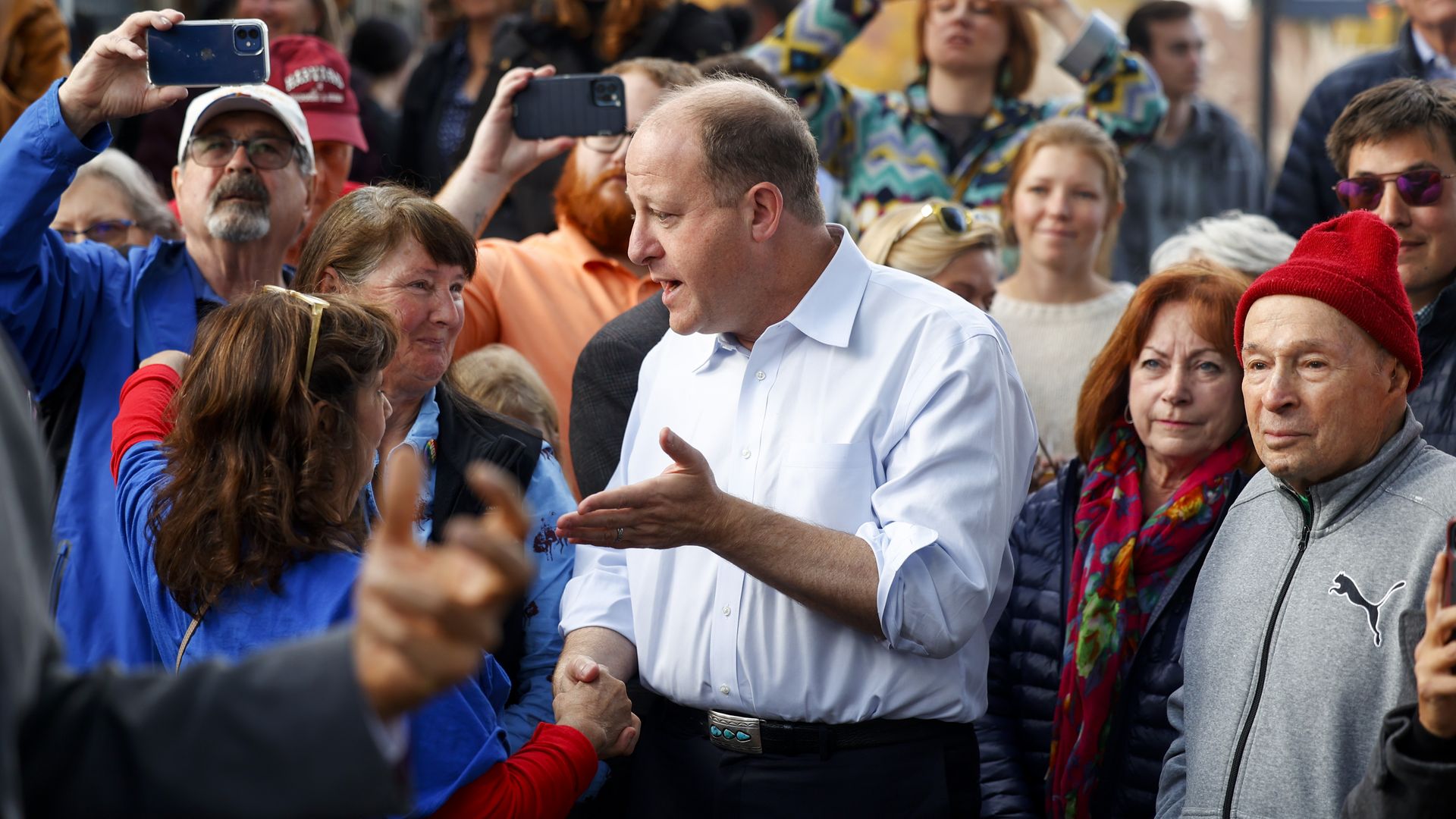What promises Gov. Jared Polis kept — and where he fell short
Add Axios as your preferred source to
see more of our stories on Google.

Gov. Jared Polis speaks to a supporter at an Oct. 26 rally in Golden, Colorado. Photo: Michael Ciaglo/Getty Images
Gov. Jared Polis made a lot of promises to get elected in 2018.
- Like, a lot, a lot.
Why it matters: Whether he kept them is one measure Colorado voters will use to determine if the Democrat deserves a second term.
State of play: An Axios Denver review of the 129 campaign promises documented in the Colorado Sun's award-winning "Polis Promise Tracker" finds he kept many of them — particularly big-ticket items such as abolishing the death penalty and protecting access to abortion.
- Our findings, taken from the full original database, essentially mirror what the Sun recently found in its analysis. Polis did plenty in his first term, but fell short in key areas.
- An important caveat: He can't take full credit for many of the promises he kept. It required a team, notably the Democratic majority in the state Legislature.
Between the lines: John led the project to track Polis' promises from the 2018 campaign. And it didn't go unnoticed by the governor, who often referenced his pledges and the tracker in conversations. His team also documented his progress.
What we found: In our review, we found dozens of promises the governor kept and plenty more for which he can claim only partial credit.
- Others stalled or remain in progress, such as efforts to convert the state to 100% renewable energy by 2040 and eliminating special tax breaks.
- Some promises Polis broke.
Here's a look at how he fared on 10 prominent issues:
[UNSUPPORTED BLOCK TYPE: header-three]
More transportation dollars: Polis vowed to build a bipartisan coalition to find new sources of revenue to improve the state's roads and relieve congestion.
- Verdict: In 2021, he signed Senate Bill 260 that created $3.8 billion in new fees for Colorado drivers and services to fund road projects, mass transit and climate initiatives.
- Of note: Still, Polis' administration is abandoning an expansion of Interstate 25 through Denver, meaning congestion will still be a big problem.
"Red flag" law: Polis said a "red flag" law would make the state safer by reducing "easy access to guns."
- Verdict: The legislation signed into law in 2019 gives law enforcement and judges the ability to take weapons that are deemed a significant risk. An analysis has shown it's mostly working as intended.
Local control on oil and gas: Polis said local governments need more power to approve oil and gas development and wanted to relook at setbacks from homes to "protect health and safety."
- Verdict: In one of his administration's first major battles, Polis backed Senate Bill 181 to overhaul oil and gas regulations and give more control to local authorities. The state's oil and gas regulators later put in place a 2,000-foot buffer between drilling and homes and schools.
Improve hospital transparency: To reduce health care costs, Polis said hospitals should be required to disclose more financial information to consumers.
- Verdict: He signed House Bill 1001 in 2019 and a 2020 measure that made it illegal for hospitals to sue patients for unpaid bills if they don't post prices. Whether the legislation lowered prices is a more complicated question, but a recent report from the state's hospital association suggested costs were below the national average.
[UNSUPPORTED BLOCK TYPE: header-three]
Full-day kindergarten: The governor's top priority when he took office was free, full-day kindergarten.
- Verdict: The governor mostly delivered — but there's some important caveats. One, it's not free; taxpayers are footing the bill. Two, it's optional for school districts and it’s only expected to increase enrollment to 85%, up from 81% at the time it was approved.
Paid family leave: Polis wanted "every Coloradan" to have paid family and medical leave.
- Verdict: Colorado voters — not Polis — approved a paid leave program and the governor didn't like how it was set up. He had a different idea that failed in the Legislature. Also, several local governments are opting out, meaning not everyone will get it.
End pay: Polis paired his call for "equal pay" with a promise to stop using a woman's salary history for state jobs "one of my first acts as governor."
- Verdict: Colorado approved an equal pay law in 2019 that took effect in 2021. It requires salaries and promotions to be posted. But didn't make the state hiring change one of "first acts."
[UNSUPPORTED BLOCK TYPE: header-three]
TABOR overhaul: Polis pledged to "build a coalition" to win approval at the ballot box for reforms to the Taxpayer's Bill of Rights, including changing the spending caps.
- Verdict: Polis backed Proposition CC at the ballot in 2018 to remove the caps, but it failed in a voter referendum. It had wide support in the business community, but conservatives helped defeat it.
Wages keep pace with inflation: Polis told workers, particularly low-income earners, that he would "make sure incomes keep pace with the cost of living.
- Verdict: Employers are boosting salaries, and the minimum wage is increasing, but it's not keeping up with cost-of-living, state economists say. In Colorado, real wages declined 1.7% since 2018.
100-day health care overhaul: In his first 100 days in office, Polis outlined a 10-point plan that he described as "common sense steps" to decrease costs and improve care in Colorado.
- Verdict: He accomplished some elements, but fell short with others, and as a whole, his plan didn't meet his self-imposed deadline.
